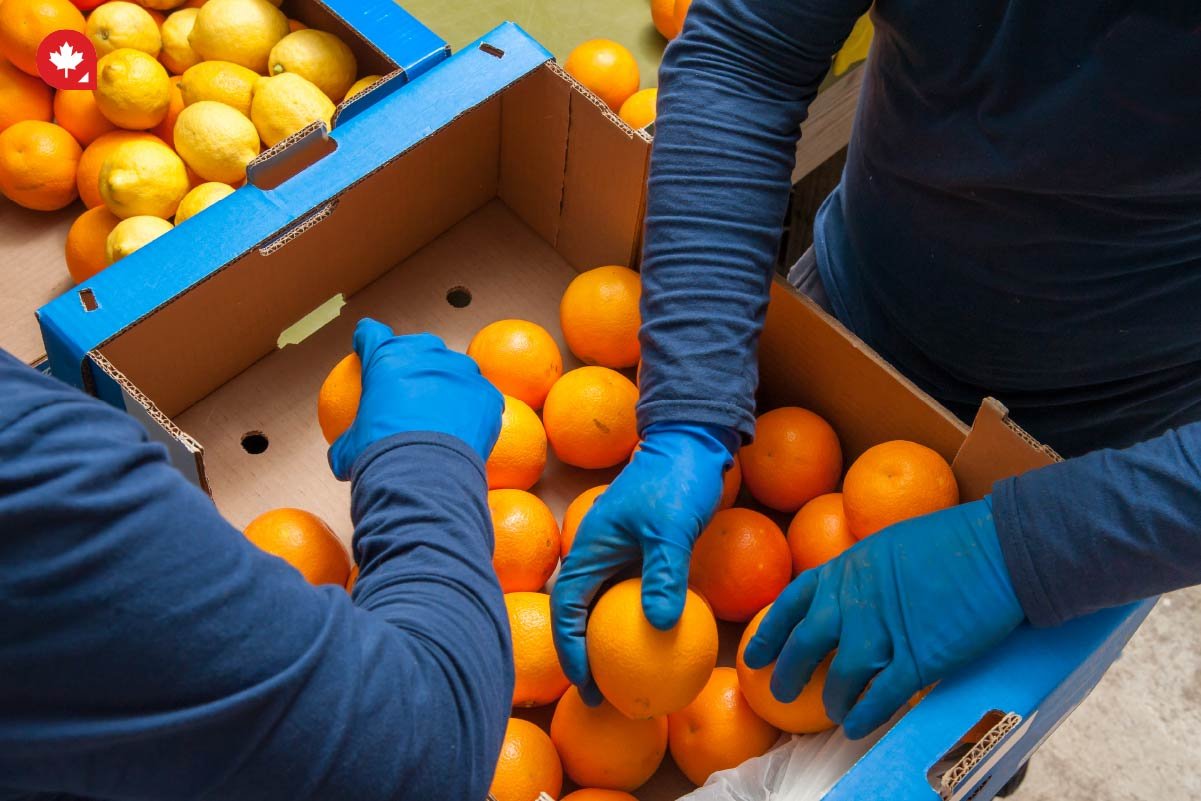If you're a passionate food service worker seeking new horizons, an incredible opportunity awaits in Canada. This vibrant nation not only offers a chance to elevate your career but also provides a superior standard of living. Foreign workers play a vital role in keeping this industry going. Over the years, many have made their mark. Ready to take your career to new heights in the Great White North? Then, let's delve into the details and discover the enriching food service worker experience that lies ahead when you immigrate to Canada.
The Food Service Industry in Canada

Canada's food services sector ranks as one of the top employers in the country, employing over a million workers across the board. With the number of vacancies in Canada recently reaching a record high of over 800 000, Job Bank predicts that the country will need around 110,000 food service workers over the next ten years..
Current vacancies on various job sites are as follows:
- Indeed.ca shows 9,572 available Food Industry jobs
- LinkedIn shows 2,000+ Food Industry jobs
- Careers in Food shows 374 job postings for food and beverage manufacturing jobs
Famous Immigrants in Canada's Food Industry
Census reports have, over the years, revealed that immigrants play a significant role in the growth of Canada's food services sector. Famous immigrants who have found success in the Canadian food service sector. These include:
- Mike Timani
- Vikram Vij
- Susur Lee
- Massimo Capra Dimitrios
- Jimmy Antonopoulos
Top Food Service Jobs in Canada
If you want to work in Canada as a food service worker, check out our list of top food service jobs with a salary estimate from Talent.com.
| Occupation | Salary Range per year |
|---|---|
| Restaurant Manager (NOC 60030) | 50,000 CAD - 100,000 CAD |
| Food Service Manager (NOC 60030) | 36,617 CAD - 81,037 CAD |
| Baker (NOC 60030) | 25,000 CAD - 45,000 CAD |
| Cook (NOC 63200) | 27,326 CAD - 40,270 CAD |
| Chef (NOC 62200) | 35,100 CAD - 67,571 CAD |
| Server/Waiter (NOC 65200) | 20,000 CAD - 35,000 CAD |
| Food Counter Attendants (NOC 65201) | 16,000 CAD - 25,000 CAD |
| Farm Worker (NOC 85100) | 27,300 CAD - 40,950 CAD |
| Butcher/Meat Cutter (NOC 63201) | 33,150 CAD - 45,819 CAD |
| Barista (NOC 65201) | 28,534 CAD - 35,100 CAD |
How to Find a Job in Canada in the Food Service Industry

Step 1: Research Canadian Job Market
Start by researching the Canadian food service industry. Understand the demand for your specific skills, explore different cities, and identify areas with a thriving culinary scene.
Step 2: Prepare Necessary Documents
Ensure you have all the required documents, including a well-crafted resume, professional references, and any relevant certifications. Verify if your qualifications meet Canadian standards.
Step 3: Check Work Eligibility
Confirm your eligibility to work in Canada. Check if you need a work permit and ensure your qualifications align with the requirements set by Canadian immigration authorities.
Ste 4: Explore Job Portals
Utilize online job portals and platforms dedicated to Canadian employment opportunities. Websites like Job Bank, Indeed, and Glassdoor often feature a variety of food service positions across the country.
Step 5: Connect with Local Networks
Join online forums, social media groups, and professional networks that focus on the Canadian food service industry. Engage with fellow professionals, seek advice, and stay updated on job openings.
Step 6: Apply Directly to Restaurants and Cafés
Don't hesitate to reach out directly to restaurants, cafés, and food establishments you're interested in. Send personalized applications and inquire about job openings, showcasing your skills and enthusiasm for the industry.
Step 7: Optimize Your Resume
Tailor your Canadian-style resume to highlight your relevant experience, skills, and achievements. Use industry-specific keywords to ensure your resume stands out to potential employers, especially those using automated applicant tracking systems.
Step 8: Prepare for Interviews
Be ready for potential interviews. Research common interview questions in the Canadian job market, practice your responses, and showcase your passion for food service and your willingness to contribute to the Canadian culinary landscape.
Step 9: Consider Temporary Positions
If possible, be open to temporary or part-time positions initially. This can serve as a stepping stone to a more permanent role while allowing you to gain valuable Canadian work experience.
Working in Canada as a Food Service Worker
To legally work in Canada's food service industry, you must have a Canadian work permit. The work permit process you follow will depend on your country of origin. There are two types of Canadian Work Permits: Open Work Permits and Employer-specific Work Permits.
The Open Work Permit
Obtaining an Open Work Permit provides the flexibility to work for any employer in Canada, except those deemed ineligible due to non-compliance with specified conditions or involvement in activities such as striptease, erotic dance, escort services, or erotic massages. This permit is granted under specific circumstances, and certain employment opportunities may necessitate a medical examination. If you prefer not to disclose your medical conditions on the open work permit, you have the option to undergo a medical exam administered by a panel physician.
Employer-specific Work Permit
A work permit tied to a specific employer allows you to work in Canada under the conditions outlined in your permit. These conditions include details such as the specific employer's name, the duration of your permitted work, and, if applicable, the designated location. Before applying for this type of work permit, your employer must furnish you with a copy of your employment contract.
Additionally, they must provide either a copy of a Labor Market Impact Assessment (LMIA) or an offer of employment number applicable to LMIA-exempt workers. Obtaining this number requires your employer to utilize the Employer Portal– Candidates can only be employed by one Canadian employer that provides a valid offer of employment supported by an LMIA. This will have to be for a set period in a set location.
Work Permit Requirements For Food Service Workers in Canada
Migration to Canada is possible for some food service workers, provided they are eligible. Requirements include:
- Education
- Work experience in a related position
- English or French language Proficiency
- No Criminal record
- Sufficient funds
Immigration Pathways For Food Service Workers in Canada

As a food service worker who wants to work in Canada, securing a job in the country and applying for a work permit would be the first port of call. But if you'd prefer to settle in Canada permanently, you'll be happy to learn that there are several immigration pathways available to make it a reality.
The Express Entry System
The Express Entry system is Canada's leading immigration channel that processes skilled worker applications at the speediest pace. As a food service worker, you can apply to Canada’s Federal Skilled Trades Program. It runs on a points-based system that ranks candidates based on many factors. The highest-ranking applicants receive Invitations to Apply (ITA).
Point criteria for Express Entry include factors such as age, work experience, education, language ability, Provincial nomination, ties to Canada, and Spouse profile.
Atlantic Immigration Program
The Express Entry System may not be an option for semi- and intermediate-skilled foreign nationals, but you’ll have one in the Atlantic Immigration Program. The particular immigration stream was established to assist employers in Canadian maritime provinces with the recruitment of foreign workers to fill labor gaps. You'll find many food service industry jobs in these regions.
The Agri-Food Immigration Pilot
As its name states, the Agri-Food Pilot focuses on attracting non-seasonal farm and livestock workers who want to settle in Canada. To qualify, applicants would have to have at least one year's non-seasonal work experience in the country and a permanent job offer in the relevant industry.
FAQs
What is the Comprehensive Ranking System?
The Comprehensive Ranking System (CRS) is a points-based system used to assess and score an applicant's profile to rank them in the Express Entry pool. Assessments are based on:
- Skills
- Employment experience
- Language proficiency
- Education
Can Low- or Semi-skilled Workers Apply to Canada's Provincial Nominee Program?
Yes. The British Columbia Provincial Nominee Program (BC PNP) and the Ontario Immigrant Nominee Program (OINP) often invite low- and semi-skilled workers to apply for a provincial nomination for Canadian permanent residency.




